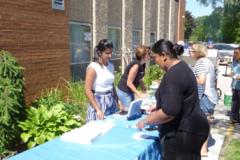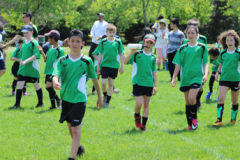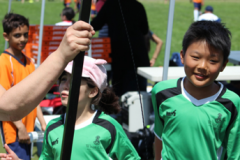Casa – FAQs
Forward
The Montessori method is an approach to education which emphasizes the potential of the child from birth to age six. This potential is developed within a prepared environment of uniquely designed learning materials under the direction of trained Montessori teachers. Maria Montessori felt that the goal of early education should be the cultivation of the child’s own natural desire to learn.
Questions
What is the absorbent mind?
What are sensitive periods?
What are the Montessori concepts of freedom and discipline?
What is “normalization”?
Who is the Montessori method designed for?
Why is a five day school week necessary for the younger Montessori child?
Should parents question their child about his classroom work and accomplishments?
What are the advantages of three year mixed-age groupings?
Isn’t Montessori schooling expensive?
How do children adjust if they make a transition from a Montessori school to another school?
What is the Absorbent Mind?
Maria Montessori compared the young child’s mind to a sponge. It literally absorbs information from the environment. Indeed, one of her books is entitled, The Absorbent Mind.
What are sensitive periods?
Sensitive periods are age periods when the child has intense fascination and unusual capabilities for acquiring particular skills. It is easier for the child to learn a certain skill during his sensitive period than at any other time in his life. For example, the sensitive period for acquiring a sense of order is 2 1/2 to 3 1/2 years old for the average child.
What are the Montessori concepts of freedom and discipline?
Montessori considered freedom and discipline as prerequisites to learning. A free child is one who prefers to work out his own problems, but will ask for direction when necessary. A child with inner discipline has developed self control over his own behavior. The Montessori classroom allows freedom of movement, freedom of choice in learning and facilitates the growth of inner discipline.
What is “normalization”?
A child is called “normalized” when he has developed inner discipline, self-assurance and a preference for purposeful activity. The Montessori environment aims to allow the child the means to normalize spontaneously.
Who is the Montessori method designed for?
The Montessori Method is an “approach to learning”, and as such, has no distinction of class or intelligence. It has been used successfully all over the world and in all types of programmes. The use of individual materials allows for a varied pace which accommodates many levels of ability. Because interest is stimulated and the materials are available, some children in a Montessori class acquire academic skills at an early age. This was not Maria Montessori’s goal. She desired only that the learning experience be a natural and joyful one for each child. She said, “It is true we cannot make a genius, we can only give each individual the chance to fulfill his potential possibilities to become an independent, secure and balanced human being”.
Why is a five day school week necessary for even the younger Montessori child?
The Montessori classroom experience is structured around five consecutive days to allow the spontaneous learning of the child to flow smoothly. A child taken in and out of school every other day does not provide the same opportunity to pursue his unfolding interest.
Should parents question their child about his classroom work and accomplishments?
Montessori education places emphasis on process rather than on product. Many learning materials do not result in a paper to bring home and are difficult for a child to describe. We ask parents not to press their child for achievement, but to provide support and encouragement. Some suggestions for this are included in the Parent Handbook. Your child’s teacher will be happy to answer your questions regarding achievements.
What are the advantages of three year mixed-age groupings?
The Montessori programme is designed to include developmental learning materials and activities which are sequential and meant to be experienced over a three year time span and not in individual, successive one year capsules. While a child may gain much from attending the programme for any length of time, full benefits are likely to require extended exposure.
Skills, such as reading, which are not so much taught as they are learned, require progressive build up for successful flowering. The same can be said for such acquisitions as personal work habits and social consciousness. These also require time for internalization.
A mixed age grouping allows younger children to have models for emulation and gives the older children an opportunity to reinforce their knowledge by helping the younger ones. Each child has the opportunity to experience being the youngest, middle and oldest member of the group.
Isn’t Montessori schooling expensive?
Tuition in a Montessori pre-school programme may seem higher than other pre-schools because of the extensive materials, five day programme, encompassing environment, curriculum and highly trained staff. It is, however, a very reasonable cost in contrast to other activities you would plan for yourself or your child.
It becomes a matter of what you value most. To give your child the finest possible experience in his most sensitive years is to give him a strong foundation throughout his life. Many educators believe that it is wiser to invest in a child’s early education than in his college education.
The child who enjoys learning and becomes self-directed at three to six years of age will benefit through all his years of learning. The expense is a profitable, long-term investment.
How do children adjust if they make a transition from a Montessori school to another school?
Much depends on the individual child and the particular school he is entering. Each situation should be evaluated separately. Montessori children are quite adaptable, since they have learned to work independently without constant supervision and more often than not, feel good about themselves and their ability to integrate well with others.
Research on children who have gone into other schools after attending a Montessori school is not extensive. However, many teachers have reported that the adjustment from free independent work to group work is not a problem. There is agreement that Montessori children are more confident, independent, self-directed, possess more initiative and often show more originality in their stories and drawings.





